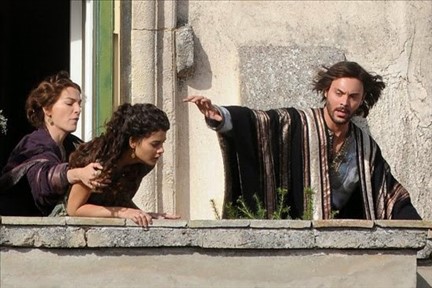Movie review: 'Ben-Hur' not only an epic failure, but a shameful smear of the classic 1959 film8/19/2016 Throwing a bunch of ingredients in a bowl, doth not an apple pie make. "Ben-Hur" (opening today) is the latest head-scratcher to come out of Hollywood, an unnecessary, unwanted remake of what should have been an untouchable classic. Taking memorable characters and scenes and shoving them kicking-and-screaming into the meat-grinder of universal modern appeal, this latest movie takes one of the greatest cinematic achievements of all time and reduce it to ground bologna. Grade: FJack Huston - a scene-stealing actor from HBO's "Boardwalk Empire" - takes on the iconic role of Ben-Hur, and he's no Charlton Heston. As the original story goes, the Jewish Prince, Judah Ben-Hur, is thrust into slavery by his Roman childhood friend, Messala (played here by Toby Kebbell, who is also no Stephen Boyd). With his story unfolding and interweaving with that of Jesus Christ, Ben-Hur seeks revenge, but learns forgiveness. He doesn't want to kill his old friend, but he looks to best him in a chariot race as a means of redemption. All the while, he looks to reunite with his estranged lover, Esther, and his missing sister and mother, whom Messala also had enslaved.
But in this remake, or "re-imagining" as the filmmakers have called it, familiarity is thrown out the window. No longer is Ben-Hur a childhood friend of Messala's, in the new version, Messala is Judah's adopted brother. No longer is Ben-Hur aching for Esther, he gets married to her. And no longer is Jesus Christ there, in the background of the story, he is now a walking, talking character in the story. And while the meat and potatoes of the "Ben-Hur" story appears intact - the early friendship between the two men, the galley ship attack, the famous chariot scene, the crucifixion - the filmmakers (and director, Timur Bekmambetov) miss the point completely. Gone are the themes of redemption and forgiveness found in the first film, and in the source material. Gone is the reverence for Christ, as he appeared in the 1959 version. And gone is any common sense as to what any of this represented in the first place. For example, in the original, there is an all-important scene where Ben-Hur, a captive, is near-death and dying of thirst. Jesus comes to him and without a word, offers him water. This gesture not only saves Ben-Hur's life, but it changes it. In the remake, Jesus comes with water, but it comes at a point in the story where Ben-Hur was just captured and was most likely not even thirsty. It undercuts the importance of the scene. Jesus, in fact, is one of the most mishandled aspects. Instead of being in awe of his presence, he instead creepily shows up and inserts himself into each scene, and in case we didn't know who he is, the filmmakers make sure to have him spout lines directly from The Bible. In the last movie, we understand his presence and his impact...here, there's no clear reason why Ben-Hur is so moved. Even his family members - stricken with leprosy but healed by their encounter with Jesus in the first film - are healed inexplicably without ever encountering the Lord and Savior in the new film. Horrible misrepresentations and decisions like this are abundant this time around. Ben-Hur no longer saves a Roman General on the galleys, and no longer falls into favor with that Roman's family. That was a key part of the original film, because it explained why Ben-Hur - a former slave and fugitive - would ever be allowed to compete in the Roman chariot races. The character of Messala is no longer a prideful example of how power corrupts, but a whiny and fragile soul who would never have rose through the Roman ranks. And it's hard to take Morgan Freeman seriously these days - especially when he's used for voice-over once again - as he delivers a performance that surely had the original Sheik Ilderim, Hugh Griffith, rolling in his grave (Griffith won the Oscar for this role). This speaks to the major underlying problem: Each scene, each character was way better the first time around. Each decision the new filmmakers make with the story is a misstep. The chariot scene - one of the best sequences in the history of film to this day - is a choppy mess and borders on cinematic blasphemy. Jack Huston is a fine actor, but can't salvage anything from the wreckage of the script. The scene where his is floating, alone on wreckage from a sinking ship, is perhaps the most symbolism this film could muster. And just because a movie has a chariot race and a character named Ben-Hur, doesn't make it "Ben-Hur." The saddest part of all, is that there is absolutely nothing wrong with the 1959 version of "Ben-Hur"...it completely holds up as a great film even in 2016. There was no reason to re-make this movie, as nothing was added to it. And if the religious themes are going to be downplayed, why not just make a stand-alone film, and call it "The Jewish Prince," or "The Chariot Racer"? Attaching the name of the original movie to this soulless drivel is just a way for the studio to try to cash in. They've already insulted our intelligence enough...who is making the decision to remake a movie like this and a better question: Why? Perhaps it's unfair to draw comparisons to a classic, and surely not many epic films can hold a candle to the 1959 version of Ben-Hur. But even as a stand-alone action film, this is an epic disaster. If you have a hankering for an epic sword and sandal flick, spend your time and money on the Heston-version of "Ben-Hur," and leave this remake in the dust. Grade: F Genre: Adventure, Drama Run Time: 2 hours, 4 minutes, Rated PG-13 Starring: Jack Huston, Toby Kebbell, Rodrigo Santoro, Nazanin Boniadi, Moises Arias, Morgan Freeman, Pilou Asbaek Based on the novel by Lew Wallace Directed by Timur Bekmambetov ("Abraham Lincoln: Vampire Hunter," "Wanted," "Day Watch," "Night Watch") Opens locally on Friday, August 19, 2016
0 Comments
Leave a Reply. |
Looking for a specific movie or review?
Search Below: Categories
All
Archives
May 2024
|
tom santilli movie reviews
Tom Santilli is a professional film critic, TV personality, host and
the Executive Producer of Movie Show Plus.
He also is the featured film critic appearing on WXYZ Channel 7 Action News in Detroit,
and appeared weekly on FOX-2 in Detroit from 2016-2020.
Feel free to use the "search" below to find your favorite titles.
TOM'S GRADING SCALE:
B- and above: Thumbs Up
C+ or below: Thumbs Down
Currently Airing:Check Local Listings
|
For more information on Movie Show Plus, Email: |


 RSS Feed
RSS Feed
